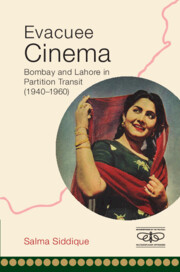Book contents
- Frontmatter
- Dedication
- Contents
- List of Figures
- Acknowledgements
- Introduction: A Moving Picture
- 1 The All-India Ambitions of Lahore
- Part 1 The Secular Stance of Bombay
- Part 2 Between Bombay and Pakistan
- Conclusion: Evacuee Cinema
- Appendix: Three Film Transcripts from the Fazli Family Collection
- Filmography
- Bibliography
- Index
1 - The All-India Ambitions of Lahore
Published online by Cambridge University Press: 11 October 2022
- Frontmatter
- Dedication
- Contents
- List of Figures
- Acknowledgements
- Introduction: A Moving Picture
- 1 The All-India Ambitions of Lahore
- Part 1 The Secular Stance of Bombay
- Part 2 Between Bombay and Pakistan
- Conclusion: Evacuee Cinema
- Appendix: Three Film Transcripts from the Fazli Family Collection
- Filmography
- Bibliography
- Index
Summary
In early 1947, Swaran Singh, a coalition minister from undivided Punjab, performed the mahurat of the film Roop Rekha at Pancholi Studios in Lahore. It was rare for a political notable to inaugurate a film shoot, and this was hailed as a sign of film production having confidently taken root in the region. Sporadic and flippant attempts at film-making, the speeches reveal, were to give way to an era of planned and well-directed films with a message. Such optimism five months before the partition plan was hardly misplaced, given that the beginning of the 1940s had seen increased and commercially viable film production in the city of Lahore, despite the restrictions of the war. As was the case with the city's printing presses and banks, the studios and film companies in Lahore were owned by non-Muslims. This ownership pattern of the film companies and studios made these targets of sectarian violence in 1947 despite employing a sizeable number of Muslims.
Existing research on colonial film centres in India approaches the ‘partnership’ between the two cities from the vantage point of Bombay's sponge-like emergence of a transregional film centre. Kaushik Bhaumik claims that by the mid-1930s, Bombay had not only absorbed Lahore's personnel but also dictated how Punjabi themes were presented. In his work, Lahore is identified as imbued by an experimental sensibility, one that provided Bombay with musical talent in the 1930s. While Bhaumik concedes a brief revival in the early 1940s, the blow dealt by partition has in most part tossed Lahore into teleological insignificance for most authoritative studies of Indian cinema. A brief footnote besides Lahore's nominal presence in Erik Barnow and S. Krishnaswamy's Indian Film reminds readers that ‘Lahore later became part of Pakistan’ and is a typical example of pre-independence film histories written from the territorial limits of later-day nation states. The following section will detail the ‘brief revival of the 1940s’, according to a readjusted view from Lahore, and appraise the significance of its creative energies.
Enquiry committee reports and newspaper advertisements of this period mention several film-producing companies that quickly changed hands or went bust.
- Type
- Chapter
- Information
- Evacuee CinemaBombay and Lahore in Partition Transit, 1940–1960, pp. 23 - 42Publisher: Cambridge University PressPrint publication year: 2023



